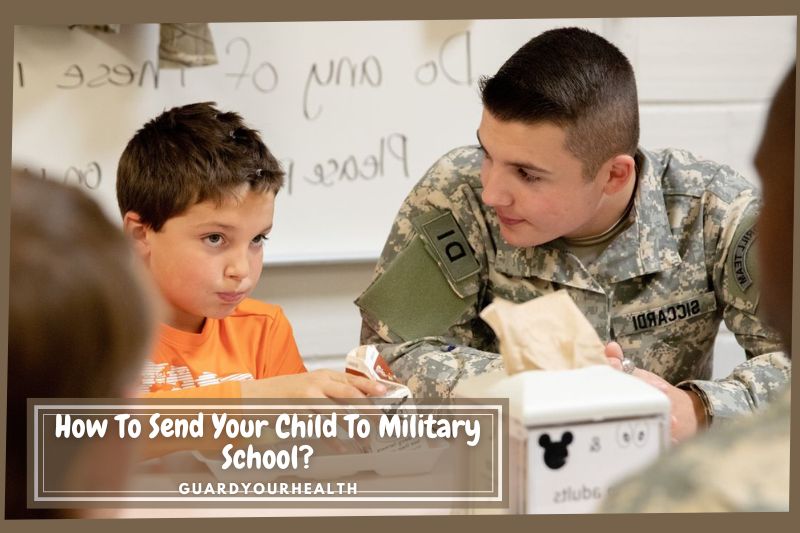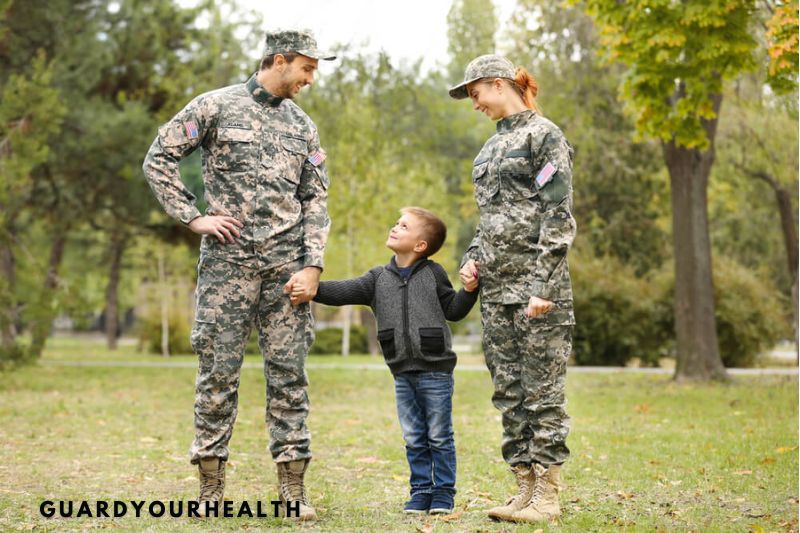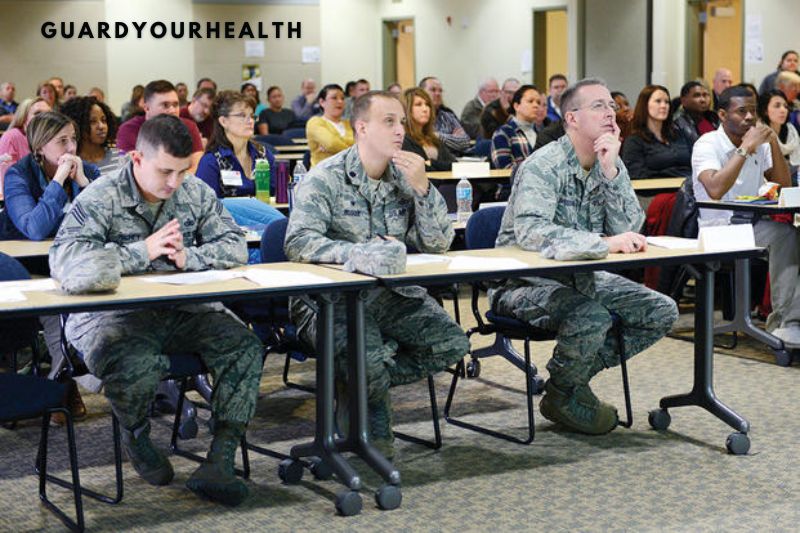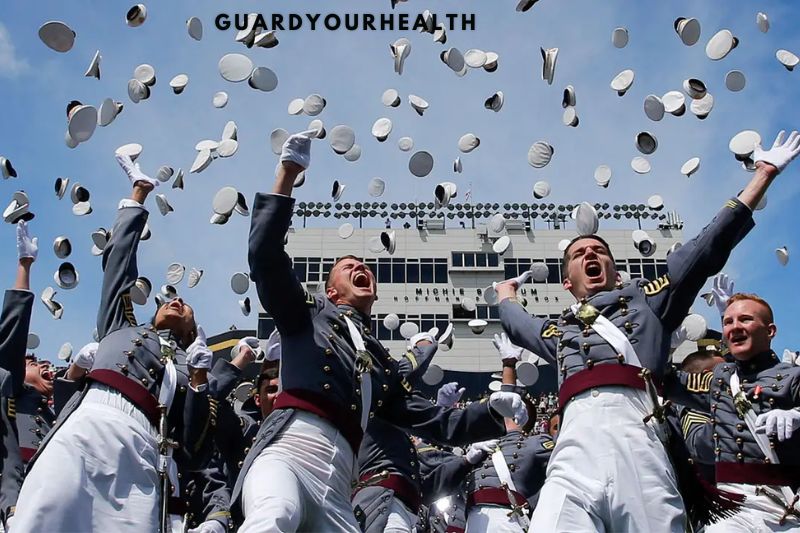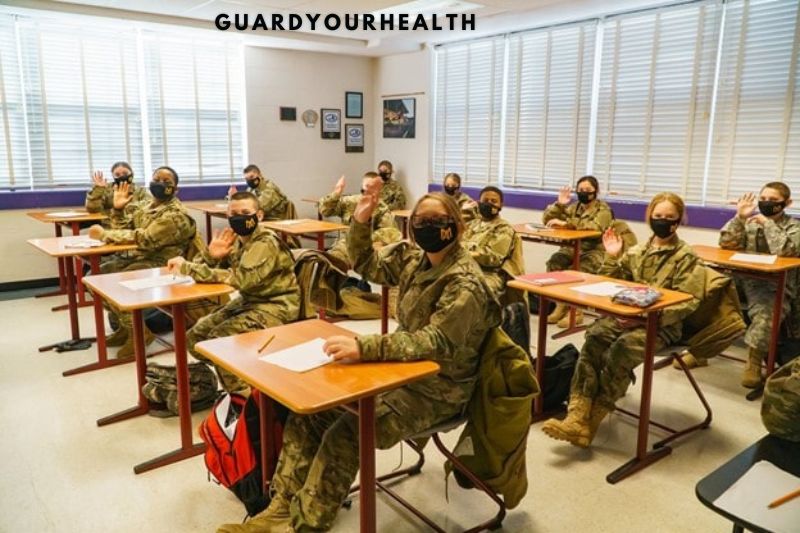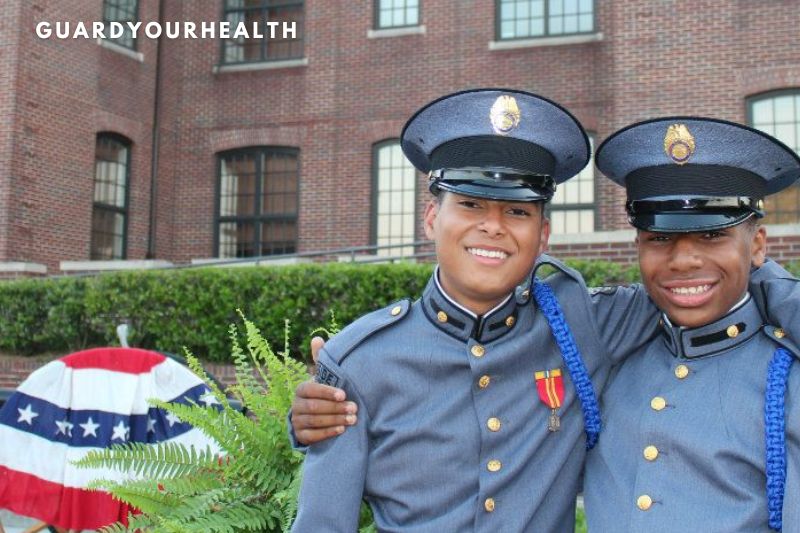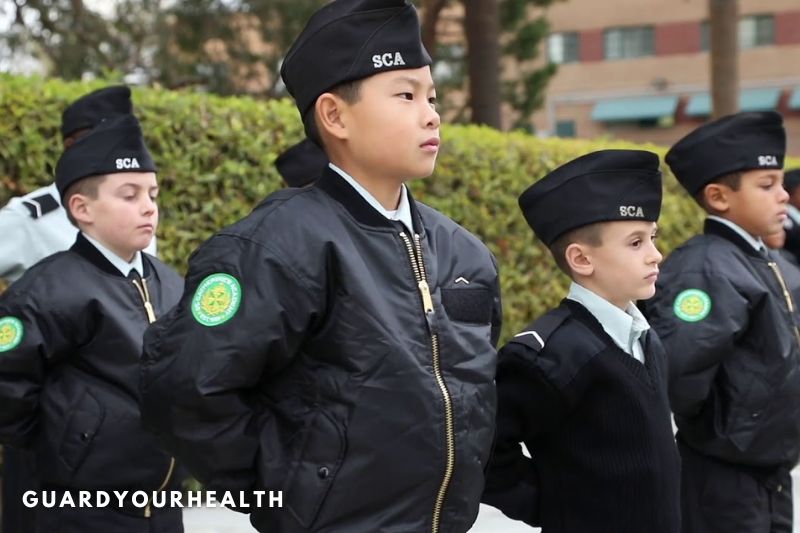Military schools are becoming increasingly popular for parents who want to give their children a structured and disciplined education. If you’re considering how to send your child to military school, there are a few things you need to know. In this article, we’ll outline the pros and cons of a military school, how to choose the right school, and what to expect from the admissions process.
Everything You Need to Know
What do business magnate Donald Trump (above), racing icon Dale Earnhardt, Jr., composer and lyricist Stephen Sondheim, and actor Lorenzo Lamas have in common? They all attended military school. And although these people are vastly different, the military school had a part in each of their routes to success in the future.
Many individuals are perplexed by the military school, and myths abound. While today’s military schools differ from the past, the purpose remains to grow young people into productive citizens and active leaders of tomorrow.
This prospective parent resource takes you inside the hallowed halls to provide an insider’s glimpse at the entire military school experience. This thorough resource is intended to help you learn all there is to know about military education so that you can make the best choice for your kid.
What is Military School?
Today’s military schools, with their rich history and promising future, provide a distinct educational option to traditional college preparation programs. Military schools include military ideas in their courses and a solid academic basis.
Students gain vital skills that will prepare them for college and lifetime success – all in a secure and supportive atmosphere. How long is military school? These prestigious educational institutions produce independent thinkers, responsible leaders, and involved citizens.
Not all military schools are the same. Today’s military schools, often known as military prep schools or military academies, provide a college preparing curriculum for pupils in grades 6-12. Do you need good grades to be in the army? There are several military schools for elementary-aged children, although they are uncommon.
Military schools have traditionally been for males because of military heritage, although many are now coeducational. Furthermore, some military schools have a religious component.
Contrary to common opinion, military schools are not intended for troublesome teenagers. They will not tolerate any guys or girls who create disruptions on campus or in the classroom. When such kids get into difficulty in college, they are either rejected outright or immediately expelled, leaving their parents to foot the price.
If your adolescent has behavioral concerns, we suggest that you seek a school for problematic teenagers, which you may locate by clicking here. A disturbed child may be able to join military school once their conduct has been brought under control by first attending a therapeutic boarding school.
Today’s independent military schools are managed by a board of trustees, which often includes parent involvement, and are not subject to state or federal inspection.
Although independent military schools supplement traditional public schools, each has its own set of objectives, standards, and settings. Tuition and philanthropic contributions directly fund independent military schools.
Independent military schools promote a well-rounded curriculum that includes many extracurricular activities and leadership activities, such as sports, the arts, student groups, and community service, in addition, to Camden military academy drugs and military core components.
Tuition and Other Fees at Military School
It is critical to understand whats military school and is not included in the tuition fee of the institution. Some schools may charge extra fees for necessary equipment and services. Uniforms and other program fees at many military colleges may add $1,000 to $5,000 or more to tuition, housing, and board costs.
Let’s look at the many types of possible charges you should be aware of:
Tuition, including Room and Board
Tuition is the fundamental cost of attending school and receiving education. Tuition at most military institutions includes room and board, which implies that lodging and meals are included in the tuition fee.
Schools may charge varying sorts of students different tuition rates:
Day Students vs. Boarding Students – Some institutions allow students who live at home and travel to school daily. Because day students do not live on campus and get fewer meals, their tuition is often cheaper than that of boarding students.
7-Day vs. 5-Day Boarding – Some schools may provide a 5-Day Boarding program, in which students return home every weekend. 5-Day boarding tuition is often cheaper than 7-Day boarding tuition, but you are responsible for getting your kid home and back each weekend.
Middle School vs. Upper School – Some schools charge different tuition rates for students in the Middle School (or junior high school) grade levels than those in the Upper School (or high school).
Domestic US Students vs. International Students – Schools in the United States often charge international students a higher tuition rate (and/or other administrative costs).
This contributes to the higher expenses of maintaining visas, passports, more complicated travel arrangements, and extra mentorship and acculturation aid required by overseas students. International students may incur extra expenses for medical insurance coverage while attending school.
Cost Consistency
Students at a military school are generally required to wear certain uniforms. Various uniform sets for different occasions, such as Class A or dress uniforms for special events or Class B uniforms for everyday use, may be included. They may wear Class C or utility uniforms like BDUs in addition to sports clothes. Hats, belts, rank and other insignia, ribbons and medals, and even sabers or swords may be required uniform accessories.
Unless the school includes uniforms in the tuition price, you may expect to spend between $1,000 and $4,000 for mandatory uniforms your first year.
Special Programs
Academic tutoring, English as a Second Language (ESL) seminars, SAT/ACT preparation courses, and dual enrollment classes that give high school and college credit may all be charged extra fees by schools.
Other Fees and Incidental Costs
Depending on the school’s requirements, you may be charged extra textbooks, needed school supplies, laundry services, technology fees, and other incidental expenditures that are not included in the tuition.
- Read more: How Much Do Military Schools Cost?
Financial Aid and Affordability
For many parents today, affordability is a major worry. Tuition and expenses for a military school might seem intimidating to many families. Most military schools provide financial assistance to assist families with these concerns about cost.
A lower tuition price school may wind up costing a family more than a higher tuition price school merely because one school gives greater financial help to the family. Based on the endowment, aid philosophy, and tuition expenses, financial assistance packages may vary widely amongst schools.
The majority of colleges provide two sorts of financial aid:
Merit-Based Scholarships
Merit-based scholarships are assistance awards awarded to students based on their academic ability, athletic abilities, or other qualities rather than documented financial need. Most schools seek to enroll great students who will contribute to improving their school and student population, and merit-based scholarships are one tool that schools employ to attain this objective.
Need-Based Financial Aid
Grants based on documented financial need are known as need-based financial assistance. Schools use need-based financial assistance to enroll students who would otherwise be unable to attend. You will normally need to fill out a financial assistance application that considers your family’s income, assets, and financial situation. Your financial assistance application may require you to provide tax returns or other paperwork.
Many families get financial assistance to help with boarding school expenses. According to figures published by the National Association of Independent Schools, the national average is as high as 36% of households. According to the NAIS, financial assistance awards may be large.
You can locate a list of military boarding schools with the greatest proportion of students getting financial assistance on BoardingSchoolReview.com. You will see that many military schools on that list have 40 percent to more than 70 percent of their students receiving financial help.
The Cost of Military School vs. The Cost of Living at Home
Considering the potential savings from enrolling your kid in a military school is critical. Having your kid away at military school might save you money each year!
As one of our student’s fathers recently informed me:
“I calculated how much military boarding school would cost me, but I failed to factor in how much money I would save by not having to feed my son every day, buy him new clothing when he desired them, pump petrol in his vehicle, pay his monthly mobile phone bill, and other expenses.” The savings were substantial.”
According to the United States Department of Agriculture, the typical household spends at least $12,980 per year on a child’s costs, such as food and clothes. When calculating the expenses of a military school, don’t forget to include the cost savings.
Is Military School Right for Your Child?
If you’re like most people, the words “military school” conjure up images of problematic children being “broken” by harsh disciplinary measures. However, the majority of these schools do not take disturbed children. A contemporary military school pupil is not the stereotypical violent, rebellious adolescent on the road to self-destruction. Rather than breaking difficult children, today’s military schools focus on assisting youngsters who want to move ahead and parents who want to help them achieve the finest education possible, free of distractions.
So, who stands out in military school?
If your kid thrives in organized situations and needs the discipline to attain their full potential, the military school may be a suitable match. Many families believe that sending their children to military school helps them uncover and develop their natural talents.
While these pupils are commonly labeled as “underachievers,” military school provides an environment that encourages them to succeed. Students with modest learning disabilities, such as ADD and ADHD, generally thrive in military schools’ smaller, more supervised classes, as long as their conduct does not become too disruptive.
While military schools are controlled, they are not the same as reform schools or boot camps. In truth, military schools are inappropriate for pupils with behavioral concerns such as poor attendance, disrespect for authority figures, difficulty with the police, drug usage, or bad grades.
Many military students must pass an admission test and have a good academic record. Military schools, unlike alternative schools, do not concentrate on remediation and are not suited to serve teenagers and families experiencing emotional or behavioral issues.
In short, a military school may be the ideal learning environment if your child requires or enjoys structure and would benefit from an academic experience that includes military, athletic, and extracurricular components.
Have you considered
If you’re still undecided about sending your kid to military school, a summer school program could help you decide. These programs allow families to sample the military school atmosphere without committing to a full year. This provides essential information about how your kid will adjust as a student and allows new students to get acquainted with the environment and its expectations.
Choosing a Military School
While all military schools have certain similarities, they also have differences in everything from curriculum to culture. The following factors must be considered while selecting a military school:
- Location
- Size
- Type of School (single-sex or coed, day or boarding, grade levels, etc.)
- Cost
- Academic Program
- Athletics
- Extracurricular Interests
- Reputation
A visit to the website of any potential school should provide useful information regarding the admissions and application processes.
A campus tour is strongly suggested when you’ve reduced your options to a few. This not only allows you to view the site and facilities firsthand, but it also allows you to immediately experience the school’s learning atmosphere and meet with current students and professors.
Each school has a unique “feel,” and visiting the campus is the greatest way to choose one that “feels right.” Remember that the school does not choose the student; the application process provides a shared chance to identify the ideal collaboration.
Can You Afford Military School?
Costs may be an issue if you are not Donald Trump at military school. Several variables determine the cost of military school. Military schools are classified into two types:
Public Military Schools
So, what do you do in military school? Public day military schools, often known as charter or military schools, are government-funded and do not charge tuition or room and board. These are not as widespread as private military schools, but they are a great choice for nearby families. Public military schools are now available in Illinois, Georgia, Maryland, Missouri, New Jersey, New Mexico, Pennsylvania, Virginia, and Wisconsin.
Private Military Schools
Private military school costs vary, but most are between $3,000 and $5,000 a month for the nine-month school year, including tuition, lodging, and board. Many demand full tuition payment in advance, while others offer flexible payment options.
Additional expenditures such as uniforms, books, transportation, enrollment fees, medical visits, health insurance, student fees, special class fees, college exams, and applications might range between $1,000 and USD 4,000.
While this fee may seem extravagant, various methods exist to reduce it. Day programs are substantially less expensive than boarding programs if you live close to the military school. Other schools have a five-day boarding program, which may assist reduce costs.
Furthermore, several schools provide sibling discounts to families with numerous children. Tuition cuts are available for early tuition payments, state residents, and teacher and staff discounts.
To assist cover expenses, most institutions provide financial aid and military scholarships, both need-based and merit-based. In addition, qualifying families may apply for educational financing.
The Admissions and Financial Aid Office at your military school can help you establish your eligibility for financial aid and direct you to scholarship options that may greatly decrease the cost of high-quality military school education.
Applying to Military School
While each school’s admissions procedure and requirements may vary, they normally consider various elements such as standardized tests, academic credentials, character references and recommendations, personal qualities, and distinctive abilities or talents.
Admission is decided by a thorough evaluation procedure conducted by each school’s Admissions Committee. The following elements are often necessary for an enrollment decision:
- Completed admissions application and application fee
- Recommendation letters from individuals who are familiar with your child’s qualities and talents, such as a principal, teacher, guidance counselor, or coach
- Copies of all previous school transcripts
- Medical paperwork, including records of recent physicals and vaccinations
The Admissions Department at each institution is available to address particular questions or concerns, give further information, or assist with scheduling a campus visit or interview
FAQs
1. Can you force your kid to go to military school?
Yes, parents can force minor children to attend military school. In the U.S., most states require children between the ages of 6 and 16 to receive formal education. Public school is the usual selection, but, in most states, parents can choose the educational method for their children.
2. Why do children go to military school?
One of the top reasons for a young man to attend a military boarding school is to learn the skills necessary for a lifetime of success. The unique combination of top-notch academics and life skills development provide graduates from these schools a set of tools which will set them apart from their peers for life
3. When should you consider a military school?
The perfect candidate for a military school is a teenager who feels a strong attraction to military life and wants to get started early on a military career. With very few exceptions, military schools will turn away applications for teenagers that are troubled, rebellious and in need of correction.
Conclusion
Thanks for reading. GuardYourHealth hopes this has helped you understand the process of sending your child to military school. It’s not an easy decision, but it can be very rewarding for you and your child. There are many things to consider, but if you take the time to research and talk to your child, you’ll be able to make the best decision for your family.

